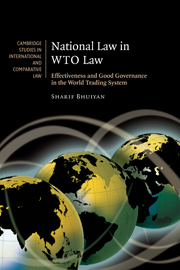Book contents
- Frontmatter
- Contents
- Acknowledgements
- List of abbreviations
- 1 Table of GATT cases
- 2 Table of WTO cases
- 3 Table of other cases
- 1 Introduction
- Part I
- Part II
- 5 The problem of characterization
- 6 Standard of review
- 7 National law as a question of fact
- 8 Mandatory and discretionary legislation
- 9 Conclusion
- References
- Index
5 - The problem of characterization
Published online by Cambridge University Press: 23 February 2010
- Frontmatter
- Contents
- Acknowledgements
- List of abbreviations
- 1 Table of GATT cases
- 2 Table of WTO cases
- 3 Table of other cases
- 1 Introduction
- Part I
- Part II
- 5 The problem of characterization
- 6 Standard of review
- 7 National law as a question of fact
- 8 Mandatory and discretionary legislation
- 9 Conclusion
- References
- Index
Summary
Introduction
As may have been noticed from the remarks made in this regard in the last chapter, different dimensions of WTO adjudicative organs' review of national measures/laws are the core and the recurring themes of this second part of the present work. However, before embarking on those issues, this chapter attempts to deal briefly with the problem of characterization that often arises in the context of WTO dispute settlement. Although it has not attracted much conscious attention, this problem also exists in other areas of public international law. In contrast to public international law, in the context of private international law, “characterization,” as discussed below, is a very well-known term of art used to describe a particular process in the selection of the applicable law.
Because the present exercise involves the borrowing of a term of art and its introduction in a new setting it may be useful as a starting point to discuss the meaning of the term more generally and likewise to make general references to the judicial faculties that may be described by the term. When it comes to meanings of words, dictionaries can of course be of some assistance. According to the Shorter Oxford English Dictionary “characterization” means “the action or result of characterizing; esp. (a) portrayal in words etc., description,” while the word “characterize” is defined inter alia as “describe the character or peculiar qualities of; describe as,” “represent, portray,” etc. In these senses it may not be an overstatement to say that the whole function of adjudication concerns characterization, i.e. characterization of facts (or rules of law) with reference to given legal concepts.
- Type
- Chapter
- Information
- National Law in WTO LawEffectiveness and Good Governance in the World Trading System, pp. 121 - 143Publisher: Cambridge University PressPrint publication year: 2007



